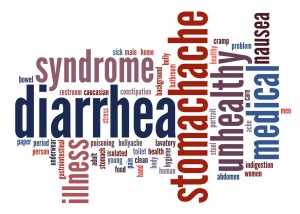Irritable bowel syndrome (IBS) in children is a functional gastrointestinal (GI) disorder, which is a problem with the way the large intestine or colon works. IBS is not a disease, but rather consists of symptoms that occur simultaneously. The most common symptom of IBS is functional abdominal pain (pain that cannot be explained by any detectable abnormality) coupled with diarrhea, constipation, or both.
Studies show that 5-20% of children report symptoms of IBS, with boys and girls being equally affected. A child who is growing normally, and has no known injury or disease, may be diagnosed with IBS if he is experiencing abdominal discomfort at least once a week for 2 months, especially in conjunction with changes in bowel movement frequency or consistency.
Irritable Bowel Syndrome and the GI Tract
The gastrointestinal (GI) tract is made up of the mouth, esophagus, stomach, small and large intestines (bowel), and anus. The colon is the part of the large intestine that absorbs liquid and nutrients that are not digested in the small intestine. Anything not absorbed by the colon is changed into solid matter called stool. The muscles in the colon work together to pass the stool into the rectum, which stores it until a bowel movement occurs.
Any interruption in this process can cause pain or discomfort. If the colon moves too fast or too slow, or stops and starts abruptly, it may produce gas, bloating, cramps, diarrhea, or constipation.
Symptoms of Irritable Bowel Syndrome in Children
While every child is different, other common symptoms of IBS include:
- A change in frequency of bowel movements
- A change in the consistency of bowel movements
- An improvement in pain level when a bowel movement occurs
- While every child is different, other common symptoms of IBS include:
- Diarrhea
- Constipation
- Mucus in the bowel movement
- Abdominal bloating
- Feeling as if the bowels are not emptied after a bowel movement
- Nausea
- Dizziness
- Loss of appetite
Causes of Irritable Bowel Syndrome in Children
The cause of irritable bowel syndrome is not certain, however, researchers believe that a combination of both physical and mental factors can contribute to IBS. Some possible triggers include:
- Diet: Spicy or fatty foods, caffeine, dairy, and consuming large meals can bring on IBS symptoms.
- Stress, anxiety, or depression
- Hypersensitivity of the bowel
- Problems with the signal between the brain and the intestinal nerves
- Bacterial gastroenteritis: Irritation or infection caused by bacteria in the stomach or intestines.
- Lactose or gluten intolerance
- Small intestinal bacterial overgrowth (SIBO): An increase in the normal amount or type of bacteria in the small intestine.
- Problem with the way food moves through the GI tract: Slow or fast movement or spasms can cause pain and diarrhea.
- Family history: Studies show that patients with IBS have a higher rate of GI problems in their family history.
Diagnosing Irritable Bowel Syndrome in Children
A diagnosis of IBS can usually be made by performing a thorough physical examination and evaluating your child’s medical history, including:
- Symptoms
- Family history
- Recent illnesses
- Stressful events
- Medications
Your doctor may recommend additional diagnostic tests to check for inflammation, infection, or other intestinal problems. Procedures may include:
- Blood tests: To check for anemia, infection, or illness.
- Urine culture and analysis: To check for urinary tract infection.
- Stool sample analysis: To check for blood, bacteria, or parasites in the stool.
- Abdominal x-ray: To evaluate the internal organs.
- Lactose breath hydrogen test: To test for lactose intolerance as a possible cause.
- Ultrasound: Creates a picture of the internal organs using high frequency sound waves.
- Lower GI Endoscopy – Colonoscopy: An outpatient procedure performed under light anesthesia whereby a long, flexible tube, equipped with a small light and camera, is inserted into the anus to examine the inside of the large intestine.
- Upper GI Endoscopy – EGD: Procedure in which an ultra-thin flexible tube, equipped with a small light and camera (endoscope), is inserted down the throat to examine the digestive tract. An endoscopy is typically performed under general anesthesia.
Treating Irritable Bowel Syndrome in Children
Treatment of irritable bowel syndrome involves alleviating symptoms to restore normal daily function. Your child’s treatment may vary depending on:
- Age, health, and medical history
- Severity of symptoms
- Tolerance of procedures or medications
- Parental preference
Diet and nutrition play an important role in managing IBS. Eating smaller, more frequent meals and keeping a diary of bothersome foods can help lessen symptoms and identify triggers. Foods that are commonly reported to contribute to IBS include:
- Dairy products
- Spicy or fatty foods
- Caffeine
- Artificial sweeteners
- Gas-producing foods, such as beans or cabbage
The low FODMAP (Fermentable Oligo-saccharides, DI-saccharides, Mono-saccharides, and Polyols) diet is a new approach to treating irritable bowel syndrome. FODMAPs are short-chain carbohydrates that produce gas due to poor absorption in the small intestine. When limited (not eliminated) in the diet, a majority of patients reported improvements in their IBS symptoms.
High FODMAP foods include:
- Milk, yogurt, and certain types of cheese
- Sugar-free gum and candy
- High fructose corn syrup and honey
- Rye and wheat breads, pastas and crackers
- Certain vegetables: Asparagus, artichokes, cauliflower, mushrooms, snow and snap peas, legumes, onion, and garlic.
- Certain fruits: Apples, cherries, apricots, watermelon, avocado, mango, pears, peaches, plums, nectarines and blackberries.
- A low FODMAP diet is not intended to be used long-term. A 6-8 week supervised diet, in which foods are gradually re-introduced has been shown to benefit patients with IBS. Consult your doctor before starting any new food regiment.
Other treatments for alleviating symptoms of IBS include:
- Stress management, such as talk therapy or hypnotherapy
- Medication: Your doctor may recommend laxatives, fiber supplements, antispasmodics, antidiarrheals, or antidepressants depending on your child’s symptoms. Consult your doctor before giving your child any over-the-counter medicines for IBS.
- Probiotics: Live bacteria similar to the natural bacteria in the GI tract, which come in tablet, pill, or powder form. Your doctor can advise you on the proper amount to improve IBS symptoms.
- Counseling and behavior modification: Amy Allen Meyer, M.Ed., LPC, RPT-S, NCC – Licensed Professional Counselor and Play Therapist. Amy is an experienced Licensed Professional Counselor, Registered Play Therapist-Supervisor and National Certified Counselor who counsels children and adolescents, ages 2-18, and their families from her private practice in Frisco, Texas.
Irritable Bowel Syndrome (IBS) in Children Resources
North American Society for Pediatric Gastroenterology, Hepatology and Nutrition
Phone: 215–233–0808
Email: [email protected]
American Academy of Pediatrics National Headquarters
Phone: 847–434–4000
American Neurogastroenterology and Motility Society
Phone: 734–699–1130
Email: [email protected]
International Foundation for Functional Gastrointestinal Disorders
Phone: 1–888–964–2001 or 414–964–1799
Email: [email protected]
Rome Foundation
Phone: 919–345–3927
Email: [email protected]
If you would like more information about gastrointestinal (GI) digestive disorders and nutrition in children, please contact Dr. Mona Dave’s Frisco Office.

